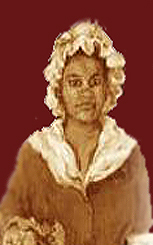Married name LUCY PRINCE, also called BIJAH’S (ABIJAH’S) LUCE, or LUCE (LUCY) ABIJAH (b. 1730, West Africa–d. 1821, Vermont, U.S.), American poet, storyteller, and activist of the colonial and postcolonial period. Her only surviving work, the poem “Bars Fight” (1746), is the earliest existing poem by an African-American; it was transmitted orally for more than 100 years, first appearing in print in 1855. Consisting of 28 lines in irregular iambic tetrameter, the poem commemorates white settlers who were killed in an encounter with Indians in 1746.
Born in Africa, Terry was taken by slave traders to Rhode Island at a very young age. She was baptized a Christian at age five, with the approval of her owner, Ebenezer Wells of Deerfield, Mass.; she became a full church member in 1744.
She remained a slave in the Wells household until 1756, when she married Abijah Prince, a free black. It is not certain if Prince purchased her freedom or if she was manumitted by Wells. In 1764 the Princes settled in Guilford, Vt., where all six of their children were born.
Terry was considered a born storyteller and poet. She was also a persuasive orator, successfully negotiating a land case before the Supreme Court of Vermont. She delivered a three-hour address to the board of trustees of Williams College in a vain attempt to gain admittance for one of her sons.
